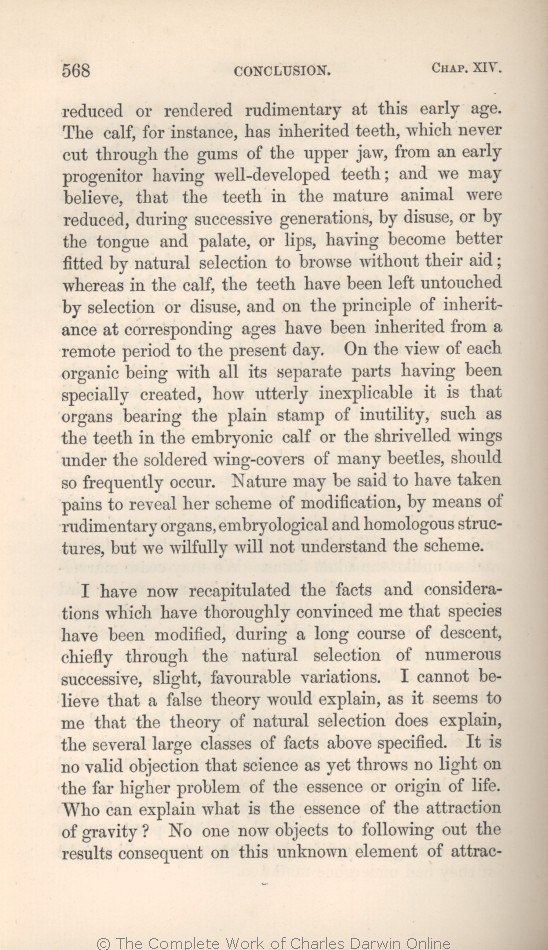not be
..| ..... 1869 1872 | | much 1859 1860 1861 1866 |
| reduced, during successive generations, 1859 1860 1866 1869 |
| reduced, during successive genera- tions, 1861 |
| formerly reduced 1872 |
| disuse, 1866 1869 1872 | | disuse 1859 1860 1861 |
| or by 1859 1860 1861 1866 1869 | | owing to 1872 |
| palate, 1861 1866 1869 1872 | | palate 1859 1860 |
| or lips, having become better fitted by 1861 1866 1869 |
| having been fitted by 1859 |
| having been better fitted by 1860 |
| or lips, having become excellently fitted through 1872 |
| untouched by selection or disuse, 1859 1860 1861 1866 1869 |
| unaffected, 1872 |
| organic 1859 1860 1861 1866 1869 | | organism 1872 |
| being with all its separate parts 1869 |
| being and each separate organ 1859 1860 1861 |
| being and each of its separate parts 1866 |
| with all its separate parts 1872 |
| inexplicable 1859 1860 1866 1869 1872 | | in-explicable 1861 |
| it is 1859 1860 1861 1866 1869 | | is it 1872 |
| organs bearing the plain stamp of inutility, such as 1869 1872 |
| parts, like 1859 1860 1861 |
| organs, like 1866 |
| ..... 1866 1869 1872 | | like 1859 1860 1861 |
| many 1869 1872 | | some 1859 1860 1861 1866 |
| ..... 1869 1872 | | thus 1859 1860 1861 1866 |
| occur. 1869 1872 |
| bear the plain stamp of inutility! Nature may be said to have taken pains to reveal, by rudimentary organs and by homologous structures, her scheme of modification, which it seems that we wilfully will not understand. 1859 |
| bear the plain stamp of inutility! 1860 1861 1866 |
| reveal 1869 1872 | | reveal, 1860 1861 1866 |
| OMIT 1869 1872 |
| by rudimentary organs and by homologous structures, 1860 1861 1866 |
| by means of rudimentary organs, embryological and homologous structures, but we wilfully will not understand the scheme. 1869 |
| which it seems that we wilfully will not understand. 1860 1861 1866 |
| by means of rudimentary organs, of em- bryological and homologous structures, but we are too blind to understand her meaning. 1872 |
|
I have now recapitulated the
..| ..... 1869 1872 | | chief 1859 1860 1861 1866 |
| been modified, during a long course of descent, chiefly through the natural selection of numerous successive, slight, favourable variations. 1869 |
| changed, and are still slowly changing by the preservation and accumulation of successive slight favourable variations. 1859 |
| been modified, during a long course of descent, by the preservation or the natural selection of many successive slight favourable variations. 1860 1861 1866 |
| been modified, during a long course of descent. 1872 |
| 8 blocks not present in 1859 1860 1861 1866 1869; present in 1872 | | This has been effected chiefly through the natural selection of numerous successive, slight, favourable variations; aided in an important manner by the inherited effects of the use and disuse of parts; and in an unimportant manner, that is in relation to adaptive structures, whether past or present, by the direct action of external conditions, and by variations which seem to us in our ignorance to arise spontaneously.
It appears that I formerly underrated the frequency and value of these latter forms of variation, as leading to permanent modifications of structure independently of natural selection.
But as my conclusions have lately been much misrepresented, and it has been stated that I attribute the modification of species exclusively to natural selection, I may be permitted to remark that in the first edition of this work, and subsequently, I placed in a most conspicuous position— namely, at the close of the Introduction— the following words: "
I am convinced that natural selection has been the main but not the exclusive means of modification." This has been of no avail.
Great is the power of steady misrepresentation; but the history of science shows that fortunately this power does not long endure.
It can hardly be supposed that a false theory would explain, in so satisfactory a manner as does the theory of natural selection, the several large classes of facts above specified.
It has recently been objected that this is an unsafe method of arguing; but it is a method used in judging of the common events of life, and has often been used by the greatest natural philosophers.
The undulatory theory of light has thus been arrived at; and the belief in the revolution of the earth on its own axis was until lately supported by hardly any direct evidence.
|
| attrac- tion; 1869 | | attraction; 1861 1866 1872 |
|









